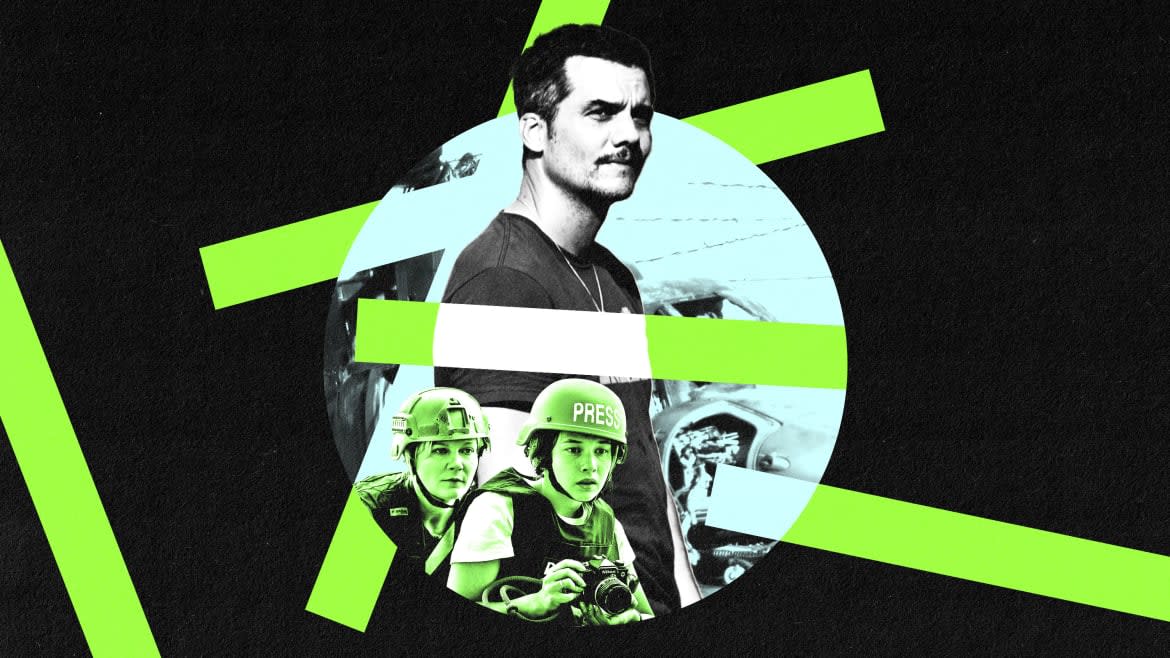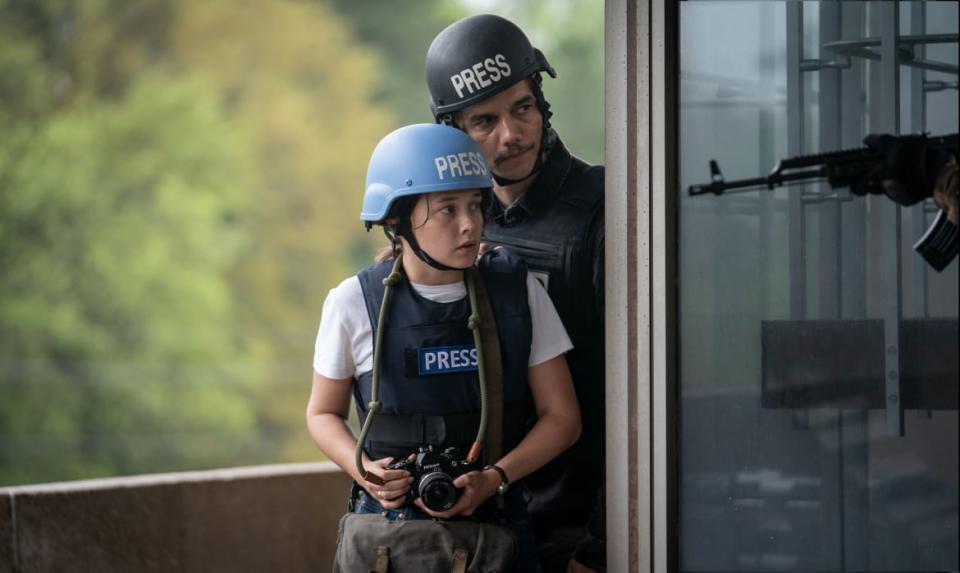‘Civil War’ and the Dangerous Myth of ‘Unbiased’ Journalism

- Oops!Something went wrong.Please try again later.
- Oops!Something went wrong.Please try again later.
- Oops!Something went wrong.Please try again later.
Alex Garland’s Civil War presents an almost unrecognizable nightmare vision of America. Our president is a fascist going on his third term. California and Texas have somehow found enough common ground to secede as allies. And, as all of this unfolds, the fictional journalists at the center of the film remain largely unfazed by the chaos, grounded in their mission to be neutral documentarians of their country’s downfall.
Civil War’s motley crew includes Lee (Kirsten Dunst), a celebrated combat photographer; Joel, (Wagner Moura) a thrill-seeking Reuters reporter; Sammy (Stephen McKinley Henderson) an aging journalist at the increasingly irrelevant New York Times eager for one last adventure; and aspiring photojournalist Jessie (Cailee Spaeny), who idolizes Lee. Together, the group sets off for the nation’s capital, hoping to get inside the White House as it falls to the “Western Forces.” (Warning: Some spoilers for the film lie ahead.)
Garland completed the script in 2020, but four years later, it’s being released into a completely different world—one in which images of clearly marked press under fire immediately conjures up parallels to the ongoing war in Gaza, and raises thorny questions about the role of journalists in an unfolding conflict.
From the beginning, Garland has been clear about his inspirations for Civil War. Though the film has earned its fair share of rave reviews, it’s also drawn criticism for its “view from nowhere” approach. Drawing on an upbringing surrounded by journalists and foreign correspondents (Garland’s father was a political cartoonist in London), he set out to make a film rooted in the principles of what he describes as “old school journalism.”
“If you have a news organization which has a strong bias, it is only likely to be trusted by the choir to which it’s preaching, and it will be distrusted by the others. So that was something journalists used to actively, deliberately, consciously try to avoid,” he said in an interview with Polygon. “And then the film attempts to function like those journalists. So this is a throwback to an old form of journalism, being told in the manner of that journalism.”
It’s an idea that Dunst’s character parrots early on in the film. As Jessie struggles to come to terms with the idea of being a neutral observer, Lee lays it out plainly: “We don’t ask questions. We record things so other people can ask the questions.” But is that really what war correspondents do? Detach themselves from any given conflict, even if it’s happening on their own soil?
Rather than dig too deeply into the divisions that led to the war, or explore the ideologies of the country’s opposing factions, Garland uses his leads’ professions as an emotional shield. The writer-director leaves the audience with no “sides” to root for, dropping us right into the thick of it all, hoping that the high-impact sound design and visceral cinematography is enough to shock us into seeing our country through new eyes.
But even our own eyes can be biased. Everything from who we put in the crosshairs of our lenses, who we leave out of the frame, the moment we choose to press the shutter, or who we see on the news as “killed” versus “slaughtered,” speaks to our worldviews, our prejudices. And as is the case in journalism, Garland’s attempt to strive for an ideal that doesn’t exist, and remain as apolitical as possible, only reveals his own blindspots.
Early in the film, the group hardly bats an eye in the middle of gunfire, even looking gleeful when the sound of nearby explosions means that there’s some “action” for them to catch. And while the residual trauma from decades of witnessing violence might explain Lee’s cold demeanor, Joel’s devil-may-care attitude is more baffling. Though it’s not made clear whether the character shares Moura’s Brazilian heritage, it is made terrifyingly obvious, in a scene with an armed extremist (played by Jesse Plemons) that Joel doesn’t easily pass as “the right kind” of American.
It’s hard to imagine how a Latino man traveling through a war-torn country steeped in decades of xenophobia and anti-immigrant rhetoric could possibly be so nonchalant about the risks he’s taking, operating as if living through a civil war would have no impact on him, regardless of who won.
Fox News Is Going to Have a Field Day With ‘Civil War’
Of course, Garland isn’t alone in believing that journalists should be beacons of objectivity, professionals whose most vital service to society depends on their ability to extricate themselves from the subjects they cover. The idea of being unbiased is harped-upon in most journalism programs and in newsrooms across the country. But the last eight years have exposed some pretty deep cracks in what was once seen as the bedrock of good journalism. Recently, more and more journalists have started to push back on how unrealistic the concept is—a tension point that’s only grown more pronounced amidst the Israel-Palestine conflict.
As journalists of color have been contending for years, the rubric of “unbiased coverage” often forces them to put aside their lived experiences and knowledge while simultaneously upholding the white, male perspective as the neutral ideal. In the U.S., journalists have been fired and barred from coverage related to Gaza for signing letters denouncing Israel’s targeting of media workers, or for their perceived bias due to their Middle Eastern heritage. At the same time, an exposé alleging that Hamas weaponized sexual violence on Oct. 7 was entrusted in part to an Israeli filmmaker with no prior reporting experience and given the front page of the New York Times. (An investigation by The Intercept later raised several concerns about the story’s accuracy.)

Cailee Spaeny and Wagner Moura in Civil War.
Over the last six months, the world has looked on as people marked “PRESS” have been surveilled, attacked, and killed in Gaza. (According to the Committee to Protect Journalists, at least 95 journalists and media workers have been killed since Oct. 7, making this the deadliest period for journalists since the organization began tracking data in 1992.) For them, there is no illusion that this conflict isn’t deeply personal.
Though it may not have been Garland’s intention, the film is a pressing reminder for us to rethink our perception of “unbiased journalism,” and who we deem worthy of the label. As freelance reporter Akram Al Satarri recently explained in an interview with NPR, he has to keep doing his job, no matter the risk, because his life depends on it.
Al Satarri’s view of journalism stands in stark contrast to Garland’s: “We as journalists are change agents. We are hoping that by comprehensive coverage of Gaza, even if it means us losing our lives… We are ready to go the extra mile for the sake of helping the people and for the sake of spreading the truth.”
‘Civil War’ Director Alex Garland Isn’t Shocked by the Discourse
As Civil War ramps up into its final act, the group moves through the White House with members of the Western Forces in search of the president. Even in the final minutes of America as they once knew it, Joel and Jessie remain relatively unmoved, their eyes fixed on their targets.
That stands in contrast to everything we’ve seen coming out of Gaza, where journalists have regularly broken down on air in response to the violence and worsening conditions. After Palestinian reporter Salman al-Bashir learned of the death of his friend and colleague, Mohammed Abu Hatab, he choked up, crying as he said the press in Gaza were “victims, live on air.” That he and other journalists struggle to hide their emotion doesn’t make their work any less vital, and doesn’t mean they’ve fallen short of journalistic standards.
In that sense, Civil War plays almost like science fiction, with Garland inadvertently dehumanizing his own characters in the process, making them into detached witnesses at best and callous adrenaline junkies at worst. It’s a movie that ultimately rings hollow, failing to connect with a world in which journalists are putting themselves in harm’s way, reporting on conflicts that they don’t have the luxury of distancing themselves from.
Get the Daily Beast's biggest scoops and scandals delivered right to your inbox. Sign up now.
Stay informed and gain unlimited access to the Daily Beast's unmatched reporting. Subscribe now.

